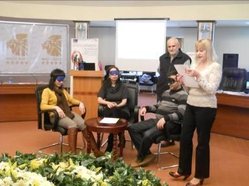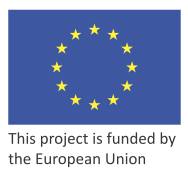 On November 22-24, 2012 in Tsaghkadzor (Armenia) training session was organized for mass media representatives within the frameworks of Cross-border cooperation for HIV/AIDS Prevention and Impact Mitigation in Southern Caucasus and Russian Federation project. The major purpose of the training was to update knowledge of journalists on HIV/AIDS basics, once more direct their attention towards HIV/AIDS related issues and promote broader coverage of this topic in the media.
On November 22-24, 2012 in Tsaghkadzor (Armenia) training session was organized for mass media representatives within the frameworks of Cross-border cooperation for HIV/AIDS Prevention and Impact Mitigation in Southern Caucasus and Russian Federation project. The major purpose of the training was to update knowledge of journalists on HIV/AIDS basics, once more direct their attention towards HIV/AIDS related issues and promote broader coverage of this topic in the media.
In Armenia awareness of general population on HIV/AIDS is quite poor; people do not assess their risk and vulnerability to HIV adequately. On the other hand stigma and discrimination towards people living with HIV is very high in Armenian communities. The given stigma has a profound effect on the prevalence of the disease.
Fear of stigma and discrimination is the main reason why people are reluctant to get tested, disclose their HIV status or to take antiretroviral treatment, which enhances the risks of spreading the disease and increases the AIDS related death toll. Unwillingness to take an HIV test essentially implies that more people are diagnosed late, when the virus has already progressed to AIDS, making treatment ineffective causing early death.
Estimated number of people living with HIV in Armenia is 3500, only one third of them know about their HIV status and the majority of HIV cases are diagnosed at late stage. Taking into account that antiretroviral treatment is available for Armenian citizens completely free of charge, early diagnosis of HIV cases is of crucial importance.
Considering the mentioned problems, the role of mass media is very important, because media is considered as a best means of raising people’s awareness and changing societal attitude towards HIV/AIDS issue and PLHIV.
The training session covered three main topics:
- Better understanding of HIV/migration issues by the journalists;
- Usage of proper language and correct terminology;
- Increase of media coverage on HIV/AIDS/Migration issues.
Fifteen journalists, with substantial experience in reporting the health issues, were invited to take part in training/master class for media representatives (print media, local television channels, social media and radio) on HIV and mobility issues. International media trainer Marina Maximova from Kazakhstan and two local experts from NCAP (National Center of AIDS Prevention) Eduard Hovhannisyan and Zhanet Petrosyan facilitated the training.
Training consisted of both theoretical and practical sessions. The program included discussions on medical and social issues related to HIV, review of ethical matters and medical terminology, analysis of media materials on HIV and AIDS, participation in role plays and practical exercises. Participants also had the chance to watch movies developed by Russian, Ukrainian, and Kazakh film producers.
Last session was dedicated to development of media materials through collecting the information from miscellaneous sources. Journalists were divided into three groups and developed three articles, which were presented on the last day of the training. Ethical aspects of reporting on HIV issues were discussed in details including role of mass media in promoting tolerance towards people living with HIV, tips for interviewing people living with HIV, significance of data privacy and confidentiality, tactfulness and objectivity of mass media publications, protection of people living with HIV from discrimination, etc.
In total, the training was a great success achieving the following results:
- Increased awareness of journalists on HIV issues and better understanding of HIV related topics (HIV basics, prevention, treatment, PLHIV issues).
- Increased knowledge on ethical principles and correct terminology for reporting sensitive issues in mass media. Journalists had opportunity to discuss different topics with experts working in the field of HIV and AIDS, improved skills of working with information sources;
- New ideas on possible media actions and coverages;
- Attitude change towards PLHIV;
- Increased usage of correct terminology.
At the end of the training journalists were sensitized around the issue of HIV/AIDS. Some of them even started to write articles during the training; according to them they started thinking whether they were using appropriate terminology and avoiding stigmatizing vocabulary.
Some of the participants planned future TV/Radio programs, taking interviews from HIV experts present at the training. Most of the participants reported HIV issues through various channels after the training, and based on their opinion the new materials differed drastically from those developed before in terms of selection of topics and terminology.
In order to follow-up the described activity World Vision PR department will perform media monitoring in future to see actual results and sustainability of this capacity building activities.
Nevertheless, after the session it became apparent that HIV/AIDS and Migration would get much higher coverage in media, which is one of the aims of the project.


